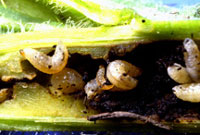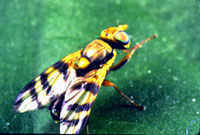Since 1987, the Plant Protection Section has conducted biological and integrated
control programs targeted at musk, plumeless, and Canada thistles. Musk thistle is now
under complete biological control through the introduction and establishment of beneficial
insects that feed on it, thereby saving farmers at least $3,000,000 every year.
Urophora solstitialis and later, a beetle, Psylloides
chalcomera, are successful. Other programs are examining the impact of timed clipping
treatments, use of the endemic pathogen Myrothecium verrucaria as a bioherbicide,
and studies on population dynamics.
Canada thistle continues to plague Maryland fields, pastures, and rights-of-way despite
the establishment of the following insects: Cassida rubiginosa, Ceutorhynchus litura, Cleonis piger, Rhinocyllus conicus, Urophora cardui, Larinus planus, and diseases: Puccinia punctiforms, and Pseudomonas syringae pv. tagetis. We are evaluating
the use of competing vegetation along rights-of-way, as well as more specific herbicides.

Puccinia
punctiformis rust on
Canada thistle
|
|

Ceutorhynchus
litura, a stem miner
of
Canada thistle

|